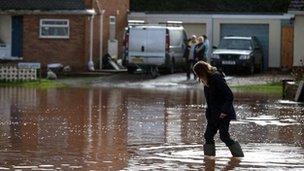Flood cover talks at crisis point, say insurers
- Published
Environment Secretary Owen Paterson: "Today's story is complete nonsense"
Talks about flood insurance are at "crisis point" and could leave 200,000 homes without cover, according to an insurers' body.
Many thousands more householders could see premiums rise if no deal is struck between insurers and the government.
The Association of British Insurers (ABI) is discussing how to provide affordable premiums in high-risk areas, but says talks are at an impasse.
But the government said there was no deadlock and talks were continuing.
The Environment Secretary, Owen Paterson, said the ABI's comments were unhelpful and would alarm members of the public.
"We have been talking to the ABI over recent months," he told the BBC.
"We are completely determined to come up with a scheme which is affordable, which is as comprehensive as possible, which also does not put a huge burden on the taxpayer.
"It is an extremely complex conundrum to resolve... and we are looking forward to receiving their most recent proposal in the next few days," he added.
Solution
The row comes as the Environment Agency says some 800 homes have been flooded in the latest storms to hit the UK.
An existing agreement, reached in 2008, obliges insurers to provide cover for high-risk properties while the government continues to improve flood defences.
Discussions have been taking place for months to try to make sure the arrangement continues after June 2013.
The ABI wants the government to share the financial risk for the areas with the most homes at significant flood risk - defined as a greater than one in 75 chance of flooding in any given year.
Nick Starling, director of general insurance at the ABI, said that the government had turned down his organisation's "elegant" solution.
ABI: "We've asked the government to provide a temporary overdraft"
He said ministers had rejected the proposal of a temporary, interest-free, overdraft for the industry, to help it meet the cost of emergencies in the first few years of the scheme while the fund builds up.
"They [talks] have reached a crisis point," he said.
"We have had two years to sort this out, during that time the insurance industry's put a massive amount of work and money into coming up with an insurance-led solution and we seem to have reached an impasse."
Insurers want householders to pay an extra £8 to £10 on top of their premiums which would go into a £100m pool used by insurers to cover flood affecting their homes.
'Affordable'
The Council of Mortgage Lenders (CML) said that a "workable" solution was needed, so households could obtain cover at a reasonable cost, otherwise it could affect mortgage offers.

The deal between insurers and the government will run out in June 2013
"If a solution is not forthcoming, then lenders will need to consider how best to approach this issue with their existing customers, and the extent to which it increases their lending risk on new loans," the lenders' group said.
Earlier in the year, a committee of MPs raised concerns about what funds were available to maintain flood defences.
It was unclear "where the buck stops" for managing the risk of flooding, a report by the Public Accounts Committee (PAC) said.
The PAC said that there was a great deal of uncertainty about whether there was enough money to improve flood defences and protection in the long term, and who paid for it.
- Published31 January 2012
- Published26 November 2012
- Published26 November 2012